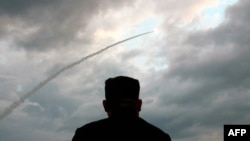North Korea test-fired two short-range ballistic missiles Wednesday, its second launch in less than a week and latest apparent attempt to increase diplomatic pressure on the United States.
South Korea’s military, which monitors such launches, says the North Korean missiles traveled about 800 kilometers, reaching an altitude of 60 kilometers, before splashing into the sea off North Korea’s east coast.
Japan’s defense ministry said the projectiles did not enter Japanese territory and fell outside Japan’s exclusive economic zone.
In a statement, the U.S. military’s Indo-Pacific Command said the launch “highlights the destabilizing impact” of North Korea’s illicit weapons program.
It is not immediately clear what type of missiles were launched. North Korea has tested several types of new, short-range ballistic missiles since 2019.
The launch comes two days after North Korea claimed to have test-fired a new long-range cruise missile. It was Pyongyang’s first known missile test in about six months.
More leverage
Late last month, the United Nations’ International Atomic Energy Agency said North Korea appears to have recently restarted a plutonium-producing nuclear reactor at its Yongbyon nuclear site.
The moves suggest North Korea is trying to increase its bargaining leverage with the United States, amid stalled nuclear talks, some analysts say. The North has often engaged in diplomacy after raising tensions via verbal threats or weapons tests.
The North’s latest launch coincided with a visit to Tokyo by Sung Kim, the U.S. special envoy to North Korea, who is meeting with his counterparts from South Korea and Japan.
On Tuesday, the U.S. envoy repeated Washington’s offer to restart talks without preconditions, saying the United States is ready to work with North Korea on humanitarian issues “regardless of progress on denuclearization.”
But Park Won-gon, professor of North Korean Studies at Seoul’s Ewha Womans University, notes that those types of statements do not appear to have satisfied North Korea.
“North Korea has many reasons to press the U.S.,” Park said. “And though Sung Kim’s expressions may sound conciliatory, he also repeatedly said that the U.S. won’t accept North Korea's demand to lift sanctions.”
Trying to get attention?
While U.S. President Joe Biden’s administration has expressed a willingness to resume talks with North Korea, much of its focus has been elsewhere, such as the withdrawal of U.S. troops from Afghanistan and efforts to fight COVID-19. Some analysts say Pyongyang may feel ignored.
“North Korea is expressing its discontent toward the Biden administration which has remained in a very passive policy toward North Korea in the name of a cautious and collaborative North Korea policy,” said Bong Young-shik, a research fellow at Yonsei University’s Institute for North Korean Studies in Seoul.
Another possible factor, Bong says, is South Korea’s upcoming presidential election. So far, the campaign has featured very little discussion about North Korea; instead, candidates have focused on the economy and COVID-19 policy.
“North Korean leadership must have decided to increase the levels of the provocations as a way of getting more attention from all the relevant parties,” he added.
Korean arms race
North Korea may also be conducting missile tests in an attempt to keep up with the expanding arsenal of its neighbor, South Korea, which has recently rolled out new ballistic missile technology.
On Wednesday — the same day as the North’s ballistic missile launch — South Korea announced it conducted its first underwater test of a submarine-launched ballistic missile (SLBM).
The test, observed by South Korean President Moon Jae-in, makes South Korea only the seventh country with a homegrown SLBM.
North Korea has not commented on the South Korean launch, but has repeatedly complained in recent months about Seoul’s military buildup.
Shift in focus?
For most of this year, North Korea has focused on domestic problems, including natural disasters, pandemic prevention, and a food shortage. Because those crises still exist, some analysts expect North Korea may refrain from major provocations, such as a long-range ballistic missile or nuclear test, that would risk bringing further economic and diplomatic isolation.
In June, North Korean leader Kim Jong Un said his country is preparing for “both dialogue and confrontation” with the United States.
A few months later, North Korea briefly reopened several lines of communication with the South, raising hopes that Pyongyang would enter a new phase of diplomacy. But the North cut the hotlines just days later, after South Korea and the United States went ahead with joint military drills that Pyongyang sees as a provocation.




